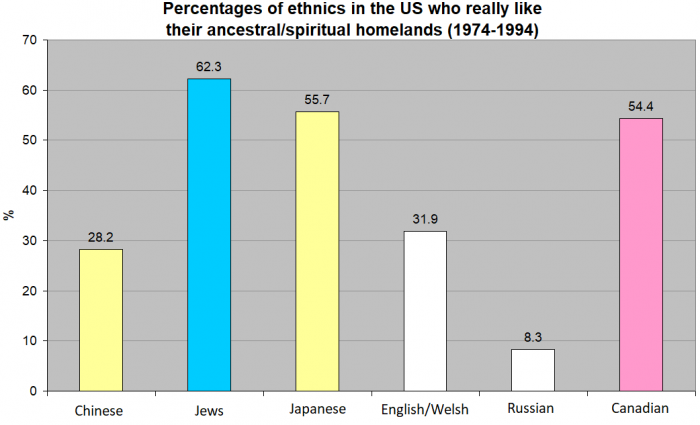Audacious Epigone has a(n anti-semitic) post but with a really interesting datapoint:

His point is on the Jewish topline, but their numbers are only moderately higher than Japan and Canada, neither of which we especially consider a threat. China and Russia… have a lot going against them and those who came here from there are adversely selected in a way that Japanese are less likely to be. The only real surprise is England (my ancestral homeland). If I were more ambitious, I’d track down the numbers for more countries because it’s really interesting. Specifically I’d be interested in Mexico, India, Vietnam, Nordica, Germany, Italy, and Ireland. Then, for good measure, theck out Texans who live elsewhere in the US.
Anyway, my guess is that the numbers for Ireland and Italy would be high and Germany would probably be somewhere in between those two and England. While I am sort of puzzled by the England number, I am also not too surprised about it. There’s something non-de-rigueur about being high on Britain and the UK, even though no other non-neighboring country has a more persistent hold on our national attention. So we pay attention to it but maybe can’t quite love it.
One alternative to that is a watering-down. Very few people are of strictly English heritage. And the two countries are so similar that we just don’t think of things in those terms, the way that others do. If you are of Russian or Japanese ancestry you are more likely to be of distinct Russian or Japanese ancestry than if you’re English. Italy and Ireland used to be more like Russia, but now are more like England. So Russia’s numbers are low and Japan’s numbers are relatively high because opinions run more strongly one way or the other due to a stronger connection. England, meanwhile, elicits a shrug. Maybe Germany, too.
I really need to learn how to use the GSS thing.
In any event, I am skeptical that the 8% that separates Jews from Canadians warrants the amount of attention directed to each.
About the Author
5 Responses to A Fond Eye Towards The Homeland
Leave a Reply
please enter your email address on this page.

I’m going to make a guess. Canadians and Japanese and Israelis/Jews who immigrate to the US are middle class or higher in social status or grew up in fairly egalitarian societies. Chinese and English and Russian immigrants were probably of lower spcial classes and therefore have less reason to think favorably of their life in their “homelands.”
Just a guess, of course, but …
Along with that, it’s worth noting that many Jewish people have ancestors from Russia, or parts of Europe controlled by Russia. For them at least, the pogroms and general persecution were enough to make them look less fondly on Russia.
I didn’t read the linked to article, but the chart’s conflation of “ancestral” homelands with “spiritual” homelands seems misplaced.
My ancestors come from (I think) England, Germany, and maybe the Netherlands. Most Jewish Americans’ ancestors probably did not come from Israel. I look overall favorably on my ancestral homelands, with some obvious exceptions for Germany and with the caveat that I have visited none of those countries. But for the most part I don’t really look on them as “spiritual” homelands.* In fact, as someone who was raised Christian, my “spiritual homeland” is, or at least was when I was devout, arguably Israel, too, or at least Rome (given the Catholic part of my upbringing).
This isn’t a criticism of Will’s post, but it is a criticism of how that chart seems to frame things.
*Maybe England/UK is a partial exception. I admire it’s constitutional history and its legal system, and I believe “we” (by which I think I mean “Americans”) owe a lot to that country.
I assume it works by self-identification. Which is to say that the Russian Jewish person identifies as Russian they’re put in that box, or Jewish if they’re put in that box.
Which does create some selection effects. The threshold for someone who is Jewish but has never been to Israel to identify with Israel is probably higher than that of China.
On the other hand, you’d think it would be the same for English. That those identifying specifically with it (instead of the “Ethnically American” which has become more popular) would be especially interested. I guess this depends on how the question was asked. If you have to put yourself in a box, some people who just don’t know may have put themselves in England by default?
That makes sense, especially the part about someone identifying as “Jewish” instead of “Russian” (and especially because that Jewish person may have been from a “non-Russian” part of Russia).